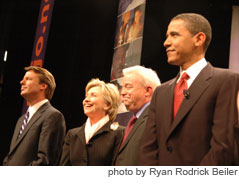 On Monday night, we saw the three Democratic front-runners for the presidential nomination deal with questions about faith in a comfortable way. They showed that faith is both personal and real for them.
On Monday night, we saw the three Democratic front-runners for the presidential nomination deal with questions about faith in a comfortable way. They showed that faith is both personal and real for them.
When John Edwards spoke of how he and his wife Elizabeth were actually “dysfunctional” for a time after the tragic death of their son, and how only “the Lord” got him through that – nobody on either side of the political aisle could have doubted the authenticity. After what many thought was an inappropriate question about Hillary Clinton’s marriage, the Senator responded with a spiritual depth and maturity that deeply impressed everyone who was watching – even her political enemies. The questions about faith, as they often do, ended up revealing more of the honest humanity of these candidates than we often see, and took them off their stump speeches.
Several political pundits and media commentators described the forum as “unprecedented” or “groundbreaking.” And I think it might well have been for two big reasons. First, the presidential forum on “faith, values, and poverty” clearly showed that faith is alive and well on both sides of the political aisle, and that God is, indeed, not a Republican or Democrat. It served to help “level the playing field” on faith and politics, where the Republicans have enjoyed a decided advantage for several decades now. Second, it clearly moved the faith and politics debate far beyond the narrow two-issue agenda of abortion and gay marriage, which have for so long been “the religious issues.”
This time the religious issues focused in on the fundamental biblical issues at stake in how we treat the poor. And the traditional hot-button issues were even brought in, with a very thoughtful exchange between evangelical pastor Joel Hunter and Hillary Clinton on how we might actually find some needed common ground on the divisive matter of abortion. But this time religion focused on social justice and that was a welcome relief from the discussion over many years now.
All this holds great promise for the future. And I am convinced that the discussion of faith and politics, religion and public life, will be a very different one – and far better one – in the election cycle of 2008 than it has been for a very long time. That broader conversation, with both sides participating fully, will better for the country, for politics, and for the faith community.
This commentary also appeared as part of the Washington Post/Newsweek On Faith online discussion.
